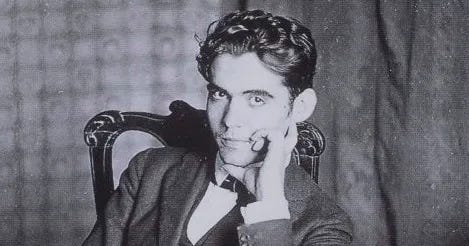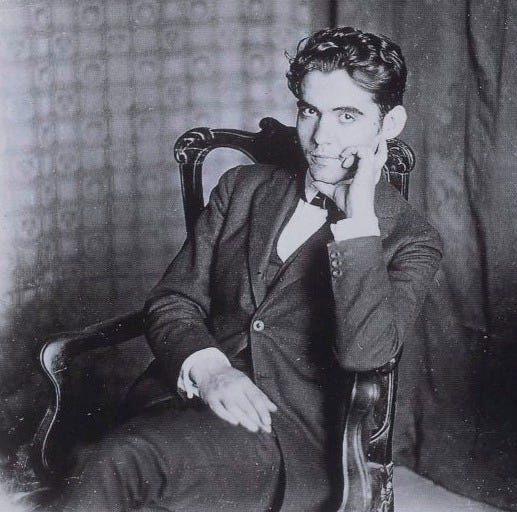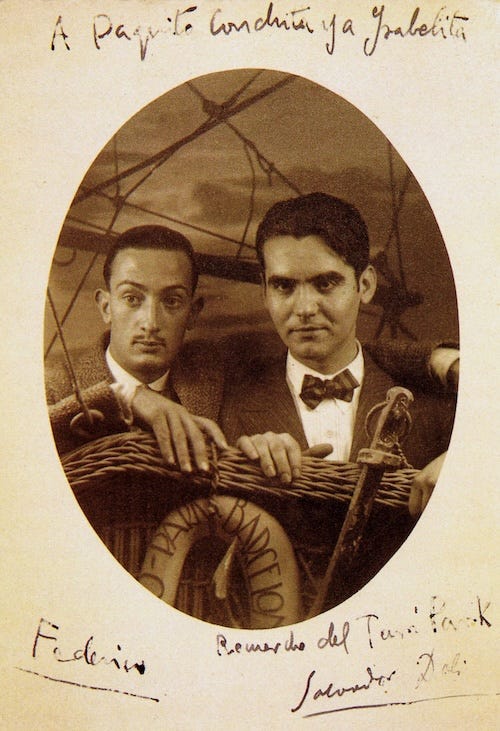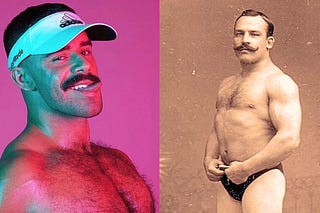
Federico del Sagrado Corazón de Jesús García Lorca
(5 June 5, 1898 – August 19, 1936)
I first encountered Federico García Lorca not on the page, but on the stage.
In 2002, I saw an amazing production of The House of Bernarda Alba at the Mark Taper Forum in Los Angeles. Starring the legendary Chita Rivera, the play was truly unforgettable, full of tension, sorrow, and simmering repression.
I didn’t know it at the time, but that play would open a door for me into the work of one of the most fearless queer writers of the 20th century.
Lorca wasn’t just a playwright. He was a poet, a dreamer, and an openly gay man at a time—and in a place—where that openness was dangerous.
“COLORING” OUTSIDE THE LINES
Born in 1898 in Granada, Spain, Federico García Lorca came of age surrounded by flamenco rhythms, Catholic rites, and the conservative expectations of a deeply traditional country.
Despite fighting depression after his relationship with sculptor Emilio Aladrén Perojo ended, Lorca had no interest in blending in. He studied literature, music, and art. He embraced folklore, surrealism, and avant-garde aesthetics.
From an early age, he chose beauty over conformity, intensity over safety.
He also chose honesty.
While Lorca never waved a rainbow flag—this was pre-Stonewall Spain, after all—he refused to hide who he was. His letters speak candidly of his romantic longing for men. His friendships with artists like Salvador Dalí were creatively electric and emotionally complicated.
Lorca’s sexuality was an open secret in his artistic circles, and the passion, frustration, and isolation that came with it fueled much of his work.
WORKING OUTSIDE THE LINES
Lorca’s creative output burns with emotion. His poems are lush with metaphor and melancholy; his plays are thick with tension and desire.
POETRY
His collection Romancero Gitano (Gypsy Ballads) blends the rawness of Andalusian culture with symbolist flair. Poet in New York, written during his stay in the US, reads like a howl against alienation, capitalism, and invisibility—especially as a queer outsider navigating a city that never quite made room for him.PLAYS
Lorca’s plays are where his emotional world explodes onto the stage. In Blood Wedding, Yerma, and The House of Bernarda Alba, love and freedom are always at odds with control and tradition. Characters ache for something just out of reach—especially the women, who, like Lorca himself, are often trapped by societal rules they never agreed to.
In Bernarda Alba, the house is both a setting and a metaphor: sealed shut, tense with silence, and ruled by fear of what others might say or think. Bernarda’s daughters are expected to suppress their wants, needs, and desires, and conform to a rigid code of obedience.
That tension—between inner truth and outward performance—is deeply queer, even if the characters aren’t.
QUEER, CREATIVE, AND TARGETED
Lorca never apologized for being himself. That boldness came at a cost.
In 1936, just as Spain spiraled into civil war, Lorca was arrested and executed by nationalist forces. He was only 38.
Though his politics and outspokenness also made him a target, most historians agree his sexuality was a major factor. Being gay, being visible, and being influential made Lorca dangerous to the rising fascist regime.
They tried to silence him. They failed.
His body was never recovered, but his body of work outlived them all.
THE SHOW MUST GO ON
What struck me first about The House of Bernarda Alba—and what still sticks with me—is how claustrophobic the world felt. How tightly wound each line was. How much was said in silence. That production led me to explore his other works and realize how many of Lorca’s characters are vessels for his own inner world: defiant, tender, haunted.
Lorca’s queerness isn’t a footnote—it’s part of his lens. He wrote as someone who loved deeply but lived in a culture that wanted him silent. And instead of shrinking, he wrote louder. Prouder.
Lorca’s work remains vital. Not because he died—but because he lived—as a gay man with creative fire, emotional complexity, and an unwavering need to tell the truth.
AND THE BAND PLAYED ON…AND ON
Lorca's legacy continues to inspire contemporary artists. A testament to this is the recent LA Opera production of Ainadamar ("Fountain of Tears"), which ran from April 26 to May 18, 2025, at the Dorothy Chandler Pavilion.
Composed by Osvaldo Golijov with a libretto by David Henry Hwang, the opera delves into Lorca's life and tragic end through the eyes of his muse, actress Margarita Xirgu.

Federico García Lorca wasn’t trying to be a symbol or a martyr. He was simply trying to be himself, do his work, and live his life. And for many of us, those remain the most powerful and inspiring acts of all.
Keep calm and Pride ON!
Clint 🌈✌️
COLLIDE PRESS is a reader-supported publication.
Please consider becoming a paid subscriber or patron.
Big thanks to all who’ve subscribed and/or supported!
FYC = LGBTQ STORIES + SUBSTACKS
- )
- )
- )
Mapplethorpe’s Radical Provocation of Desire (
)I Thought I Was The Wrong Kind Of Gay (What Are We Doing Here?!)
ON THIS DAY = JUNE 5
BIRTHDAYS
1842 = Andrew George Scott = Irish-Australian folk hero 🌈
1883 = John Maynard Keynes = British economist and intellectual 🌈
1895 = William Boyd = American actor and producer
1898 = Federico García Lorca = Spanish poet, playwright, and director 🌈
1898 = Salvatore Ferragamo = Italian shoe designer
1926 = Johannes von Thurn and Taxis = German businessman 🌈
1928 = Tony Richardson = English film director 🌈
1934 – Bill Moyers = American journalist
1941 – Spalding Gray = American writer, actor, and monologist 🌈
1947 – David Hare = English director, playwright, and screenwriter
1947 = Laurie Anderson = American performance artist and musician 🌈
1951 = Suze Orman = American financial advisor, author, and tv host 🌈
1953 – Kathleen Kennedy = American producer and executive
1956 – Kenny G = American saxophonist, songwriter, and producer
1959 = Gustáv Slamečka = Czech politician 🌈
1964 = Lisa Cholodenko = American film and television writer-director 🌈
1967 = Ron Livingston = American actor
1974 = Chad Allen = American actor and psychologist 🌈
1978 = Nick Kroll = American actor and comedian
1979 = Pete Wentz = American singer-songwriter, actor, and fashion designer
1983 = Geena Rocero = Filipino-born American model 🌈
1991 = Ninja = American professional gamer
1995 = Troye Sivan = Australian singer-songwriter and actor 🌈
EVENTS
1883 = The first regularly scheduled Orient Express departs Paris.
1945 = Benjamin Britten's opera Peter Grimes premieres in London.
1981 = The Morbidity and Mortality Weekly Report of the Centers for Disease Control and Prevention reports that five people in Los Angeles, California, have a rare form of pneumonia seen only in patients with weakened immune systems, in what turns out to be the first recognized cases of AIDS.
2004 = Noël Mamère, the mayor of Bègles, conducted a marriage ceremony for two men, even though same-sex marriage in France had not yet been legalised.
HOLIDAYS + OBSERVANCES
Pride Month (ongoing)
PORTRAIT + QUOTE OF THE DAY
“To burn with desire and keep quiet about it is the greatest punishment we can bring on ourselves.”
Federico García Lorca, Blood Wedding and Yerma




















Federico García Lorca is one of my favorite poets of all time. His work and his tragic end touched me forever when I was a just a teen living in Uruguay. The way he was betrayed by a member of his own family and the cruelty with which his fascist assasins tortured him before they killed him, will never be erased from the collective memory of the heroic people of the Spain. All lgbtq+ people in the world can be proud of him. He was, without a doubt, one of our martyrs.
I am so grateful and honoured to see my creative challenge mentioned here—woven so thoughtfully into an essay that itself was such a beautiful, rich read.
@Clint Collide 🌈✌️, you crafted this piece with such care—your words made Lorca’s legacy pulse vividly through the screen. Reading it, I felt that ache between longing and constraint you describe so well, and the fierce defiance that still speaks through his work.
To be included in this celebration of queer creativity—alongside such a luminous voice—means more than I can easily say. Thank you for that gift. And thank you for continuing to create spaces where our stories, past and present, can be seen, honoured, and shared.
Pride on—and onward.